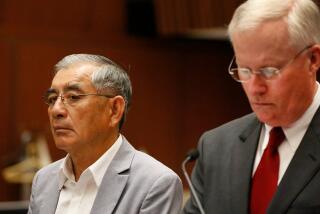Democratic fundraiser indicted
A federal grand jury indicted Democratic fundraiser Norman Hsu on Tuesday, accusing him of operating a massive Ponzi scheme that bilked investors out of at least $20 million and making illegal campaign contributions to Sen. Hillary Rodham Clinton and other candidates.
The indictment, handed down in U.S. District Court in Manhattan, formally charged Hsu with six counts of mail fraud, six counts of wire fraud and three counts of violating the Federal Election Campaign Act.
Prosecutors said Hsu promised investors hefty returns on deals to provide businesses with short-term financing, persuading hundreds of people nationwide to entrust him with more than $60 million.
But there were no such deals, the indictment says. Though Hsu made some payments to sustain investors’ faith, tens of millions of dollars may have ended up in his pockets.
A spokesman for Hsu declined to comment on the indictment or on whether Hsu was engaged in plea negotiations with prosecutors.
Hsu remains in the San Mateo County jail, awaiting sentencing on an unrelated theft charge. Federal prosecutors said they expected him to be transferred to face the new charges in New York “in the coming weeks.”
Hsu, 56, emerged on the political stage four years ago, swiftly gaining entree into the Democratic Party’s elite by raising more than $1.6 million for an array of candidates.
The dapper Hong Kong native had a flair for the high life. He wooed political insiders with expensive food and wine. Much of the money he raised went to Clinton’s campaigns, and he ingratiated himself with members of her staff by treating them to a trip to Las Vegas.
Hsu’s political profile helped persuade prospective investors that his business was legitimate, prosecutors said.
In the indictment, his political and financial machinations are inextricably linked. According to prosecutors, Hsu pressured investors to make campaign contributions to his chosen candidates as a condition of doing business with him. Prosecutors said he also used proceeds from his fraudulent venture to illegally reimburse some investors for campaign contributions made in their names.
Hsu’s dizzying rise came to an abrupt halt in late August when the Los Angeles Times reported that he was a fugitive, wanted in California on a 1991 theft charge.
At that point, Hsu stopped making payments to investors, and the bridge-loan scheme collapsed.
Candidates who had clamored for his support distanced themselves and gave away his contributions.
The Clinton campaign went further, refunding more than $800,000 in donations raised by Hsu.
Howard Wolfson, a spokesman for Clinton’s campaign, declined to comment on Hsu’s indictment.
Beyond indicating the scope of investors’ losses, the indictment added little new information to allegations previously made in a criminal complaint that federal authorities filed against Hsu in September, or in civil lawsuits filed against him by investment companies in New York and Orange County.
In the criminal complaint, authorities said Hsu had confessed to FBI agents that the short-term financing deals were “phony,” and that he had pushed investors to make campaign contributions.
Hsu’s lawyer has said the confession should be thrown out because federal investigators obtained it when Hsu was recovering from an apparent suicide attempt and was unrepresented by counsel.
If convicted, Hsu faces a maximum of 20 years in prison on each fraud count and five years in prison for each campaign finance violation, as well as substantial fines.
Prosecutors have requested that Hsu be compelled to forfeit the proceeds of his alleged fraud, as well as his extensive wine collection and a saxophone signed by former President Clinton.
More to Read
Get the L.A. Times Politics newsletter
Deeply reported insights into legislation, politics and policy from Sacramento, Washington and beyond. In your inbox three times per week.
You may occasionally receive promotional content from the Los Angeles Times.










